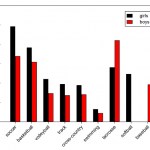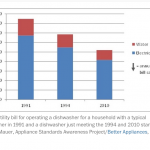Culture
Back before The Pip was born, our previous departmental administrative assistant used to bug me-- in a friendly way-- about how Kate and I ought to have another kid. (She had two kids of her own, about two years apart in age.) "When are you guys going to have another baby?" she would ask, and I always said "We're thinking about it."
About a week passed between the last time we had that exchange and the day I came in and taped ultrasound photos of the prenatal Little Dude to my door. "You sonofabitch!," she said (again, in a friendly way), "You were expecting this whole time!" "Yeah," I said…
When I was going through the huge collection of photos I have from the Forum in Rome, I kept running across pictures containing two young Asian women (neither of them Kate). This isn't because I was stalking them, but because they were everywhere, stopping for long periods in front of virtually every significant ruin and striking exaggerated poses for each other to take photos of. I had to carefully frame a few of my own photos to avoid them, but I did also take a few that deliberately included their posing, because it was so amusingly over the top.
Tourists taking photos of each other in…
I've had this piece by Rick Borchelt on "science literacy" and this one by Paige Brown Jarreau on "echo chambers" open in tabs for... months. I keep them around because I have thoughts on the general subject, but I keep not writing them up because I suspect that what I want to say won't be read much, and I find it frustrating to put a lot of work into a blog post only to be greeted by crickets chirping.
But, now I find myself in a position where I sort of need to have a more thought-out version of the general argument. So I'm going to do a kind of slapdash blog post working this out as I type…
The tagline up at the top of this blog promises "Physics, Politics, and Pop Culture," but unless you count my own photos as pop art, I've been falling down on the last of those. This is largely because, despite being on sabbatical, I've been so busy running after the kids that I don't have much time for pop culture. And also because this is kind of a frustrating pop-culture moment, with a number of media currently dominated by works that just aren't my thing.
That's a critical bit of context for my reaction to a recent Salon interview with music critic Jim Fusilli, which sports the headline "…
As I go through my daily routine, I find myself sort of out of phase with a lot of the Internet. My peak online hours are from about six to ten in the morning, Eastern US time. That's when I get up, have breakfast, and then go to Starbucks to write for a few hours.
This means that most of the other people awake and active on my social media feeds are in Europe or Australia. And my standard writing time ends right around the time things start to heat up in the US. I do continue to have access to the Internet through the afternoon, of course, but unless I have a deadline coming up, I'm often…
The topic of sports injuries is unavoidable these days-- the sports radio shows I listen to in the car probably spend an hour a week bemoaning the toll playing football takes on kids. Never a publication to shy away from topics that bring easy clicks, Vox weighs in with The Most Dangerous High School Sports in One Chart. You can go over there to look at their specific chart, which is drawn from a medical study of cheerleading; I don't find the general ordering of things all that surprising.
There was, however, one aspect of this that I found sort of surprising, namely the difference between…
Engaging in a bit of tab clearance before I head off to DAMOP tomorrow afternoon, I noticed that I still had How to Teach an Ancient Rape Joke open. This is because while I found it kind of fascinating, it's not all that directly relevant to what I do, and I didn't have anything all that concrete to say beyond "Huh. That's interesting." So it languished in one of the many, many open tabs cluttering up Chrome, too interesting to just close but not anything I could see a clear angle to comment on. And eventually it was sort of forgotten until I set about paring down open tabs before an out-of-…
As an anthropologist, I find the interface between technology and the larger culture in which it is embedded fascinating. You all know the old story of the family cook who habitually cuts the ends off the roast before slipping it in the oven. One day her child, hoping some day to be the family cook, asks why this is done. It turns out that nobody can remember, and the matter is dropped. But the question comes up again, at a later family dinner, this one attended by great grandma, who was the family cook a generation ago, and of course, she knows the answer.
"Back in the day," she says, "…
Over the last month or so, it's been kind of hard to avoid this book, even before it hit stores. Big excerpts in the New York Times and The Guardian generated a good deal of buzz, and arguments on social media. Unsurprisingly, as one of the main elements of the book is a look at the phenomenon of social-media shaming, so anybody who had participated in or even watched one of these unfold had an opinion.
I've enjoyed Ronson's previous books a great deal, because he brings a real empathy to all the interviews and profiles he does. Even when he's profiling really problematic people, like some of…
So, as alluded to over the weekend, the Hugo nominations this year are a train wreck. The short fiction categories are absolutely dominated by works from the "slates" pushed by a particular collection of (mostly) right-wing authors and that prion disease in human disguise "Vox Day." The primary purpose of the "slates" is to poke a stick in the eye of people on the other end of the political spectrum within SF, which is why three of the five nominees in one category got to John C. Wright channeling the spirit of Ayn Rand. If you want a round-up of the entirely predictable reactions to this…
I mentioned last week that I'm giving a talk at Vanderbilt tomorrow, but as they went to the trouble of writing a press release, the least I can do is share it:
It’s clear that this year’s Forman lecturer at Vanderbilt University, Chad Orzel, will talk about physics to almost anyone.
After all, two of his popular science books are How to Teach Physics to Your Dog and How to Teach Relativity to Your Dog. Orzel, an associate professor of physics at Union College in New York and author of the ScienceBlog “Uncertain Principles,” is scheduled to speak on campus at 3 p.m. Thursday, March 26.
As…
Two roads diverged in a yellow wood, And caused me no small amount of panic For traveling both of them would be good But there simply was no way I could Until I remembered quantum mechanics.
So half my wavefunction I sent left And rightward steered the other half Both pieces of me with equal heft And thanks to calculations deft, I knew the end would sum both paths
Plenty of physicists claim to know Or at least will confidently speculateThat collapse, or a pilot wave's flow, Or decoherence act to make it so. Me, I just shut up and calculate.
So in the woods I went two ways To return together…
As previously mentioned, SteelyKid has started to get into pop music. In addition to the songs in that post, she's very fond of Katy Perry's "Roar," like every other pre-teen girl in the country, and also this Taylor Swift song:
I've seen a bunch of people rave about this, but honestly, I found it pretty forgettable until I read Jim Henley's Twitter exegesis in which he shows that the song is really about the tryst with an alien that left Swift with a faceless hybrid infant. That is, a blank space-baby. Now I can't get the idiot song out of my head.
Anyway, a week or two ago, I actually went…
A few years back, I became aware of Mike Brotherton's Launch Pad Astronomy Workshop, and said "somebody should do this for quantum physics." At the time, I wasn't in a position to do that, but in the interim, the APS Outreach program launched the Public Outreach and Informing the Public Grant program, providing smallish grants for new public outreach efforts. So, because I apparently don't have enough on my plate as it is, I floated the idea with Steve Rolston at Maryland (my immediate supervisor when I was a grad student), who liked it, and we put together a proposal with their Director of…
Back on Thursday when I was waiting to be annoyed by a speech, one of the ways I passed time was reading stuff on my phone, which included This Grantland piece about Charles Barkley and "advanced stats". In it, Bryan Curtis makes the argument that while Barkley's recent comments disparaging statistical tools seem at first like just the same old innumeracy, it's really a question of ownership.
But Barkley was firing a shot in a second war. Let’s call it Moneyball II. This clash doesn’t pit a blogger versus a newspaperman in a debate over the value of PER. It pits media versus athletes in a…
Yesterday was Founders Day at Union, celebrating the 220th anniversary of the granting of a charter for the college. The name of the event always carries a sort of British-boarding-school air for me, and never fails to earworm me with a very particular rugby song, but really it's just one of those formal-procession-and-big-speaker events that provide local color for academia.
This year's event started, as always, with a classical music performance-- a song by Aaron Copeland, this time, so we've at least caught up to the 20th Century. (I'm not sure I want to live long enough to see a Bob Dylan…
The AAAS annual meeting was last week, which apparently included some sessions on social media use. This, of course, led to the usual flurry of twittering about the awesomeness of Twitter, and how people who don't use Twitter are missing out. I was busy with other stuff, so I mostly let it pass, and of course I can't find representative examples now because Twitter.
The truth is, though, Twitter is kind of useless. Or, rather, it's only useful for certain kinds of things-- it's social media, and much more social than media.
So it's a great medium for talking to people you're not physically…
I've seen a bunch of re-shares of this Vox profile of a "Men's Rights Activist" on various social media channels, with reactions varying from "This is fascinating" to "Boooo-ring." I thought it was sort of interesting, but not really in the way it was intended to be. The thing I found most striking the way the author, Emmett Rensin, introduces "Max":
In the popular imagination, Men's Rights Activists are "neckbeards": morbidly obese basement-dwellers with a suspect affection for My Little Pony. But Max is remarkably unassuming in appearance, handsome enough and normally tall; equally…
Two language-related items crossed in the Information Supercollider today: the first was Tom's commentary on an opinion piece by Robert Crease and Alfred Goldhaber, the second Steven Pinker on the badness of academic writing.
All of them are worth reading, and I only have small dissents to offer here. One is that, unlike Tom and Crease and Goldhaber, I'm actually just fine with the popular usage of "quantum leap" for a particularly dramatic change. Yes, I realize that the canonical "quantum jump" is the smallest possible change, but I think that's putting too much emphasis on only one aspect…
The London School of Economics has a report on a study of academic refereeing (PDF) that looked at the effect of incentives on referee behavior. They found that both a "social incentive" (posting the time a given referee took to turn around the papers they reviewed on a web site) and a cash incentive ($100 Amazon gift card for meeting a 4-week deadline) worked to increase the chance of a referee accepting a review request, and improved the chances that they would meet the deadline. The effect of cash was a little smaller for tenured faculty, but they were slightly more susceptible to the…




